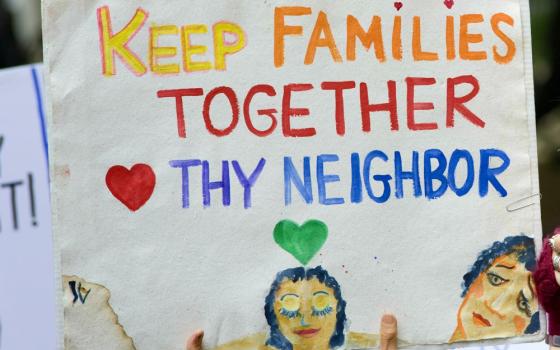My 96-year-old dear friend Mabel, confined to her sick bed, never stops being the activist she was in her younger days with Dorothy Day and the Catholic Workers. One day when I visited she commanded (in a tone of voice she earned raising her 10 children), "You should write about the similarities between the treatment of slaves and the treatment of refugees." A lifelong learner, Mabel is currently taking a digital course on African American history, and she supplies my thesis: "Slave owners separated slave children from their families. That's what they're doing now at the border."
Yes, America has a history of oppression of "the other" that renews itself over and over, unfortunately with the approval of our country's citizenry. As once we oppressed slaves, now we oppress refugees. A most painful suffering for slaves in the past and refugees in the present is separation of families. A mother like Mabel knows.
White slave owners used the threat of selling slave family members to far-distant places to get what they wanted from their "property." In response, slave mothers and fathers disfigured and injured themselves before they went on the auction block, trying to lower their price so they could remain with their children. Parents also lied about their child's potential, hoping to forestall a master's selling the slave's dearest and only connection, his or her children. Still, families were separated — over and over again.
Today, President Donald Trump's immigrant and refugee policies, including separation of families, is as immoral — and legal — as in slavery times. Trump's June 2018 "zero tolerance policy" made lawful the cruel practice of separating children and parents. When the policy became public, loud public fury caused the president to revoke this order. At that time, the government said that at least 2,668 children suffered under this policy; new reports claim the government has no clear picture of how many children had been "ripped from their parents" before zero tolerance policy became public.
Restoring children to their parents has been a very messy process, because such poor records were kept during the separation period. True to form, the president's next order included imprisoning families and children for an unlimited time. Such policies are intended to make immigrants and refugees do what the president wants: stay in their home countries — no matter how dangerous — stay or lose their most precious connection, family.
Fear is another similarity between slavery and current immigration policy. Because slaves outnumbered them, white owners feared a majority black revolt. To prevent rebellion, owners applied cruel forms of torture and death in response to any attempted run for freedom. Lawful, such tactics were justified because white people thought they were called by God to control the dangerous and feared non-white "other": African, pagan, savage, primitive.
Fear of "the other" underlies immigration and refugee policies today. Trump claims that hidden among the non-white Central Americans walking toward the border are many who present a "clear and present danger," people like: Middle Easterners (i.e. "terrorists"), American flag burners, toxic disease carriers, criminal drug dealers, violent felons. These must be stopped from crossing the border not only by a high wall but also by military force. Such words and actions stoke fear in the souls of white Americans, fear of living without the white privilege that is the American way of life. While calling himself a nationalist, not a white supremist, the president excludes non-whites in order to protect America not only from violent threats but also from cultural values of immigrants, be they Muslim, Christian or whatever.
Long ago Christians who "owned" other human beings justified themselves by quoting Romans 13. Thus it was no great surprise when in June 2018 then-Attorney General Jeff Sessions justified the "zero tolerance policy" of taking refugee children from their families with the same Scriptural passage, citing the "clear and wise command in Romans 13, to obey the laws of government because God has ordained them for the purpose of order."
Late-night comic Stephen Colbert gave the best rebuke to Mr. Sessions. A devout Catholic as well as a powerful media voice, Colbert taught me more about the content of Romans 13. For Verse 9 reads, "Love is the fulfillment of the law." The attorney general's quote is what children are taught. Hopefully, mature adults, like Mabel, embrace the wiser quote.
Today, there are 25 million refugees across the globe, according to the United Nations, and among them 3.1 million asylum-seekers. Less than one percent of refugees fleeing war and persecution are resettled. In the fiscal year that ended Sept. 20, 2018, the United States only admitted 18,214 refugees, down from 22,900 in 2017. Creating a world where immigrants, refugees, migrants and people on the move are treated with dignity, respect, welcome and belonging is a world-wide task. May all Americans work and pray to transform the land of the free into a place where, indeed, "Love is the fulfillment of the law."
[Francine Dempsey has been a Sister of St. Joseph of Carondelet, Albany, N.Y., for 60 years. She is a retired educator, long-time justice advocate, a freelance writer and a member of the Eyes Wide Open of Northeast, New York.]

